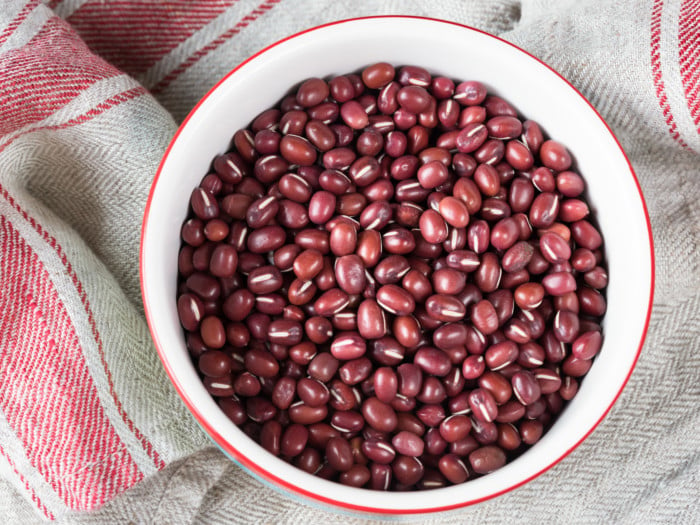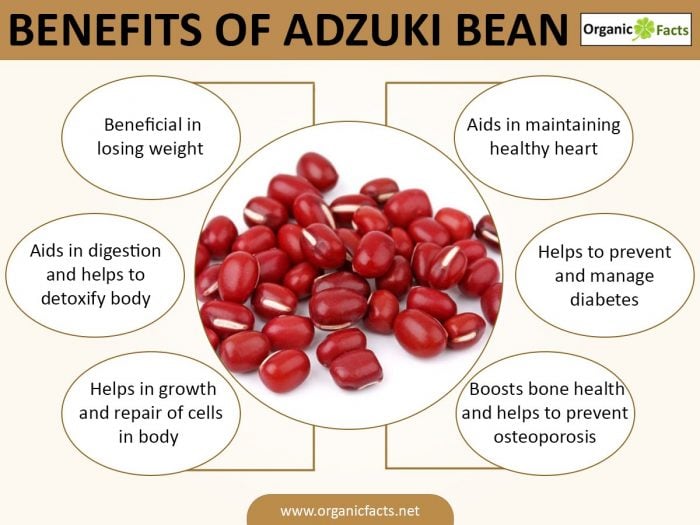The most unique and important health benefits of adzuki beans may include their ability to aid in weight loss, prevent and manage diabetes, optimize digestion, contribute to growth and repair, increase energy, lower blood pressure, reduce birth defects in infants, and detoxify the body.
What are Adzuki Beans?
These small beans are native to East Asia and the Himalayan region and are commonly eaten in Japan, China, Korea, and other Asian nations, although they can be found in other parts of the world due to exportation. The name adzuki comes from the Japanese language, although the pronunciation often sounds like “azuki”. These beans are primarily red in color, but white, black, and mottled cultivars can also be found in certain areas. The scientific name of the beans is Vigna angularis, and they grow annually. [1]
These beans are primarily used for sweetened culinary applications in Asian nations, such as in the preparation of natto in Japan. When adzuki beans are boiled and sweetened into a red bean paste, the applications are endless, in savory dishes, sweet desserts, sushi, candy, cakes, or as a topping for waffles, biscuits, or bread. It can even be used to make ice cream. Most people think of beans as savory, but adzuki beans are meant to be sweet. [2]

Adzuki beans, also called azuki or aduki, may boost heart health and weight loss. Photo Credit: Shutterstock
| Serving Size : | |
|---|---|
| Nutrient | Value |
| Water [g] | 13.44 |
| Energy | 329 |
| Energy [kJ] | 1377 |
| Protein [g] | 19.87 |
| Total lipid (fat) [g] | 0.53 |
| Ash [g] | 3.26 |
| Carbohydrate, by difference [g] | 62.9 |
| Fiber, total dietary [g] | 12.7 |
| Calcium, Ca [mg] | 66 |
| Iron, Fe [mg] | 4.98 |
| Magnesium, Mg [mg] | 127 |
| Phosphorus, P [mg] | 381 |
| Potassium, K [mg] | 1254 |
| Sodium, Na [mg] | 5 |
| Zinc, Zn [mg] | 5.04 |
| Copper, Cu [mg] | 1.09 |
| Manganese, Mn [mg] | 1.73 |
| Selenium, Se [µg] | 3.1 |
| Thiamin [mg] | 0.46 |
| Riboflavin [mg] | 0.22 |
| Niacin [mg] | 2.63 |
| Pantothenic acid [mg] | 1.47 |
| Vitamin B-6 [mg] | 0.35 |
| Folate, total [µg] | 622 |
| Folate, food [µg] | 622 |
| Folate, DFE [µg] | 622 |
| Vitamin A, RAE [µg] | 1 |
| Vitamin A, IU [IU] | 17 |
| Fatty acids, total saturated [g] | 0.19 |
| Fatty acids, total monounsaturated [g] | 0.05 |
| 18:1 [g] | 0.05 |
| Fatty acids, total polyunsaturated [g] | 0.11 |
| 18:2 [g] | 0.11 |
| Phytosterols [mg] | 76 |
| Tryptophan [g] | 0.19 |
| Threonine [g] | 0.67 |
| Isoleucine [g] | 0.79 |
| Leucine [g] | 1.67 |
| Lysine [g] | 1.5 |
| Methionine [g] | 0.21 |
| Cystine [g] | 0.18 |
| Phenylalanine [g] | 1.05 |
| Tyrosine [g] | 0.59 |
| Valine [g] | 1.02 |
| Arginine [g] | 1.28 |
| Histidine [g] | 0.52 |
| Alanine [g] | 1.16 |
| Aspartic acid [g] | 2.36 |
| Glutamic acid [g] | 3.1 |
| Glycine [g] | 0.76 |
| Proline [g] | 0.87 |
| Serine [g] | 0.98 |
| Sources include : USDA [3] | |
Adzuki Beans Nutrition
Adzuki beans may be packed with nutrients. They may have a good amount of fiber, protein, complex carbohydrates, and advantageous plant compounds. Moreover, they may be rich in antioxidants, which are plant compounds that aid your body against aging and fighting diseases.
Like all beans, adzuki also harbors antinutrients that may help reduce the body’s capability to absorb minerals.
Health Benefits of Adzuki Beans
Besides the unique flavor, the nutrients of adzuki beans are also quite important; let’s take a look at the health benefits of adzuki beans.
May Improve Digestion
Like most bean varieties, adzuki beans may be high in dietary fiber, one of the key elements of digestive health. Fiber stimulates peristaltic motion, moving food through the digestive tract and enabling the smooth intake of nutrients from food. Fiber might also help eliminate constipation, diarrhea, and bloating. [4]
May Help Manage Diabetes
The dietary fiber in adzuki beans may have a second purpose, regulating the activity of insulin receptors in the body to ensure that blood sugar levels remain normal. Furthermore, as per a recent study published in the Therapeutics and Clinical Risk Management journal, eating food made of adzuki bean may reduce inflammation and improve glycemic control in patients with type 2 diabetes. [5] [6] [7]
May Improve Heart Health
Folate, potassium, magnesium, and dietary fiber may combine into a potentially powerful cardiovascular boost in adzuki beans. Dietary fiber may help balance cholesterol levels, while potassium relaxes blood vessels and increases blood flow, thereby reducing the blood pressure and strain on the heart. This may help lower your chances of developing atherosclerosis. [8]
May Aid In Growth & Repair
There may be a significant amount of protein in adzuki beans, which is a crucial element of our diet, particularly for vegetarians and vegans who don’t get protein from animal sources. Proteins break down into essential amino acids that our body needs to create new cells, tissues, and organs for both growth and repair. Foods like adzuki beans may also provide us with an energetic boost due to that high protein content. [9]
May Help In Weight Loss
Many people in Asian countries and abroad may turn to adzuki beans (and other bean varieties) for weight loss. The dietary fiber and protein content may satiate the appetite and make you feel full, without contributing a sizable amount of calories. 115 grams of adzuki beans (1/2 cup) may only be equivalent to 150 calories, which means that you can get a whole lot of nutritive benefits without packing on any pounds. [10]
May Assist In Detoxification
Adzuki beans may contain a unique mineral known as molybdenum in quite high concentrations. This is a trace mineral and may not be found in many foods, but it might play a crucial part in the detoxification of the liver. Even a half-serving of adzuki beans can provide 100% of the daily recommended intake of molybdenum. [11]
May Prevent Birth Defects
The high content of B vitamins, particularly folic acid, may help prevent the development of birth defects in unborn babies. Neural tube defects are a direct result of a folate deficiency, so the high content in adzuki beans can ensure a healthy delivery.

Boil adzuki beans and add them to your salads. Photo Credit: Shutterstock
May Better Bone Health
If you want to prevent osteoporosis and delay the onset of “old age”, adding minerals like zinc, copper, and magnesium to your diet may seriously boost your bone strength and prevent bone demineralization. Adzuki beans also may contain these important minerals to keep you feeling young. [12]
May Improve Skin Health
Adzukis might be excellent for exfoliation and cleansing of the skin. You can use the bean powder with some aloe gel to make a nourishing face mask. The beans can possibly help reduce skin infections and swelling. [13]
How to Cook Adzuki Beans
These beans are quite easy to cook with, here’s how:

A Simple Way to Cook Adzuki Beans
Ingredients
- 4 cups of dried adzuki beans
- 8 cups of water
Instructions
- To cook adzuki beans, first, sort the beans to remove any bad ones.
- Place the beans in a strainer and rinse underwater.
- Once washed, place them in a large pot and cover with enough water so they have room to expand.
- Refrigerate the pot. Meanwhile, let the beans soak for a minimum of 8 hours, if not a full day. You can also boil the beans for 2-3 minutes and let them sit for a few hours. This way, the sugars that cause digestive distress are reduced.
- Drain the beans, and refill the pot with three parts of water for one part beans.
- Boil and then lower the heat to let simmer.
- Check on the beans after 45 minutes by sinking a fork into one bean. If the bean can be cut easily, the batch is done. If not, continue to cook until it becomes tender.
- Turn off the heat when done, and drain the water. The beans are now ready to be added to any dish of your choice.
Notes
Word of Caution: Red bean paste is often an acquired taste, and many people are disgusted by the smell. However, other people find it to be very pleasant. If you are the former, try a different bean, but if you’re the latter, then enjoy! Adzuki beans are not known as an allergenic food.
